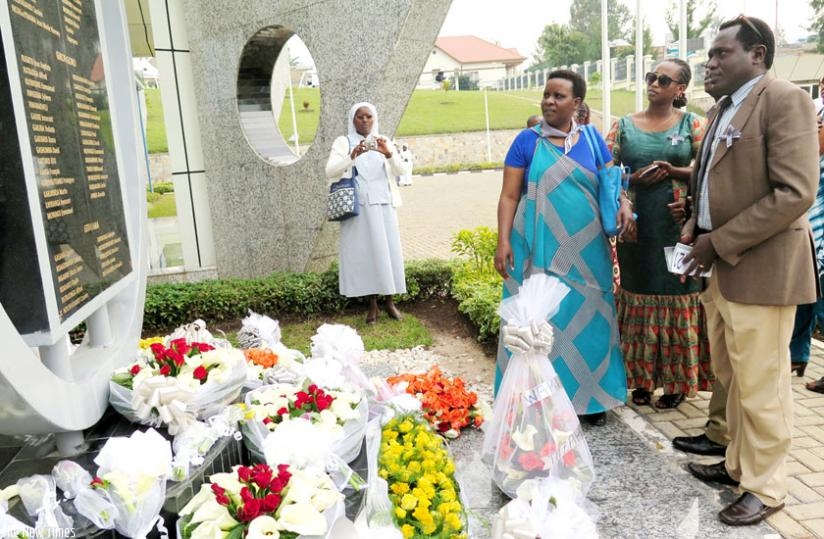The National Commission for the Fight against the Genocide (CNLG) has urged survivors and any other person keen on exposing the truth about the 1994 Genocide against the Tutsi to come forth and give testimonies that will help expand the bank for Genocide related archives.


The National Commission for the Fight against the Genocide (CNLG) has urged survivors and any other person keen on exposing the truth about the 1994 Genocide against the Tutsi to come forth and give testimonies that will help expand the bank for Genocide related archives.
The call was made, last week, during the commemoration of the over 100 employees who worked at the former Gitarama, Butare and Gikongoro prefectures, now constituting the Southern Province, killed during the Genocide.
The event took place at the provincial headquarters in Nyanza.
Dr Jean Damascène Gasanabo, the director-general of research and documentation at CNLG, said recording Genocide-related testimonies and carrying out relevant research would help future generations have real accounts of the Genocide and its cruelty as well as its aftermath and devise ways to prevent its recurrence.
"A district might want to keep information about the Genocide through carrying out research about the Genocide in various areas. The same applies to any institution. CNLG is willing to facilitate this process,” he said, adding that the government plans to conduct a comprehensive study to ascertain the exact number of Tutsi killed in 1994.
Gasanabo said some people, including some that formerly occupied senior positions at the International Criminal Tribunal for Rwanda (ICTR) in Arusha, Tanzania, have for years tried to promote the theory of double genocide."Such theories will only be challenged through collective efforts to record our own history,” he said.
Gasanabo also cited the documentary, ‘Rwanda, the Untold Story,’ produced last year by the BBC, which distorted facts about the Genocide against the Tutsi.
"All these practices of distorting of facts are intended to destroy or undermine what Rwanda has achieved in the last 21 years. Some people are frustrated when they realise the tremendous development Rwanda is achieving, hence resort to distorting facts on where we are coming from. We should not allow that,” he said.
Fighting deniers
Gasanabo said fighting Genocide denial requires concerted efforts by all Rwandans to shun the wrong and embrace good governance for the improved welfare and development for all.
The Southern Province governor, Alphonse Munyantwari, said leaders should take the lead in the fight against the genocide ideology and denial so that the deniers keen on reversing recent gains fail in their efforts.
"The province is mulling ways to record survivors’ testimonies in the very near future so that there will not be risks to lose some evidence and such evidence will effectively respond to deniers,” he said.
Prof. Immaculée Mukashema, the representative of the victims’ families, said it is a pity that the Tutsi workers were killed when working hard to build their country.
"Instead of rewarding them for their hard work, they got killed, which is a tragic failure by the then government,” Mukashema said, adding that everyone should strive to give actual Genocide related information in a bid to fight Genocide denial.
Justin Semanyenzi, who testified at the event, said prior to the Genocide, even the few Tutsi civil servants were replaced in various institutions and administrative units before the killing started on massive scale.
He cited the killing of the Prefect of Butare, Jean Baptiste Habyalimana, the only Tutsi holding that position in the country at the time.
editorial@newtimes.co.rw


